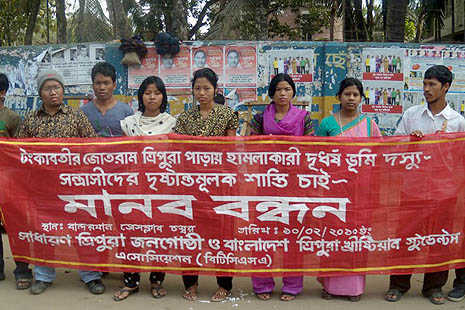
A recent UN study says gross human rights violations as a result of inadequate implementation of a decade-old peace accord have given rise to political instability and ethnic conflicts in the remote Chittagong Hill Tracts (CHT) in southeastern Bangladesh. “The likelihood of such outcomes is evident from the occurrence of conflicts between settlers and indigenous peoples and violence in the post-accord period,” it says. UN Special Rapporteur Lars-Anders Baer conducted the study on the status of implementation of the CHT Accord of 1997 after the Permanent Forum on Indigenous Issues appointed him in 2009 to undertake it. He visited Bangladesh in September 2010 where he met with various government officials, including the minister for foreign affairs and the state minister of the ministry of Chittagong Hill Tracts affairs. The study will be presented at the tenth session of the UN Permanent Forum on Indigenous Issues May 16-27. “The lack of substantial progress is leading to an increasing sense of frustration and disillusionment among the indigenous peoples in the region,” Lars-Anders Baer said in the study. The hill people are losing their faith in the pledges of the present government for not adequately implementing the accord. The accord ended a 25-year low-intensity guerrilla war between 11 indigenous groups, numbering around half a million people, and the government. The accord was intended to establish self-governance in that part of Bangladesh consisted of three hilly and forested districts bordering Myanmar. The accord followed many years of political, economic and social marginalization of the indigenous people that led to the guerrilla war. The war intensified after 1975, when Bangladesh's founding leader, Bangabandhu Sheikh Mujibur Rahman, was assassinated by military personnel and a military regime took power in a coup d’état. As a counter-insurgency measure, a government transmigration program, carried out between 1979 and 1984, brought an estimated 400,000 Bengali settlers into the CHT. Prior to that, construction of a dam in CHT in 1963 inundated 40 percent of the arable land in the region and displaced more than 100,000 indigenous people, while during the insurgency later, 70,000 went to neighboring India. Bengalis illegally occupied the lands of the indigenous peoples on a large scale and this issue became one of the main sources of conflict between the indigenous peoples and Bengali settlers and the army. Successive governments tried to solve the problem by military means and the CHT soon became heavily militarized. There were estimates of more than 500 army camps throughout the region. There were widespread and systematic violations of the human rights of the indigenous inhabitants, mainly perpetrated by Bangladesh security forces. These included unlawful killings, detention without trial, torture, rape, destruction of houses and property and forcible occupation of their ancestral lands, according to the study. However, the 1997 peace accord between Parbatya Chattagram Jana Samhati Samiti (PCJSS) and the government recognizes CHT as a tribal inhabited region, its traditional governance system and the role of its chiefs, and provides building blocks for regional autonomy. It also agreed settling the land disputes, repatriate and rehabilitate the refugees and internally displaced persons. The 1996-2001 Awami League government could not do much to implement the accord while the BNP-Jamaat alliance (2001-06) government that followed simply rejected the accord. The present Awami League-led grand alliance, in its election manifesto before 2008 polls, pledged full implementation of the accord within its administration that ends in 2013. However, most of the crucial provisions of the accord remain unimplemented, or only partially implemented, including some critical clauses such as the settlement of land disputes, demilitarization and the devolution of authority to local institutions, said Lars-Anders Baer. Gross human violations also continue. In most cases such violations are carried out with impunity, the study said. Escalating communal tensions and incidents of violence between the indigenous people and the settler community in the region give further cause for concern, Baer said. A recent incident of inter-communal violence in February 2010 left three tribal people dead and 500 homesteads burned down and the alleged involvement of the army sparked mass controversy. On April 17 this year three more Bengali people were killed in communal violence and about 30 tribal houses were burned to ashes. Of the heavy military presence, Baer said, “This is an excessive amount, by any standard, especially in a country that is not participating in a war, is at peace with its neighbors and has no prevailing insurgency situation.” The study found that most international refugees had been repatriated and rehabilitated; however "no practical steps have been taken to rehabilitate the internally displaced persons". In CHT, about 17,000 tribal people among nearly half a million various ethnic tribals in total are Catholic. Related report The Chittagong Hill Tracts peace process is stalled BA14087


